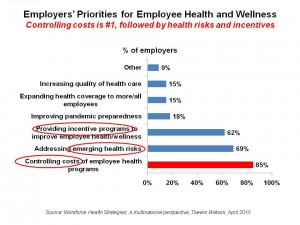Employers globally are looking to manage health care costs. Health cost containment is not the sole province of American companies.
Health and well-being are now seen by companies in North America and Asia, polled by Towers Watson in the study, Workforce Health Strategies: A Multinational Perspective. The survey was completed in late 2009.
The most important reasons why global companies are engaging in employee health strategies are to retain key talent, to contain/reduce the organization’s health care costs, to ensure business continuity, to increase productivity, and to provide competitive compensation packages. 2/3 of employers said their objective was also to increase employee engagement.
Population health is a priority for companies around the world. However, only 30% provide health promotion, health screenings and behavioral health programs in the countries in which they operate. Only 25% perform health risk assessments in most countries. 40% of companies polled provide case management programs for specific conditions.
Global employers rank the top population health issues as:
- Stress, noted by 55%
- Aging workforce, 40%
- Increased prevalence of chronic health conditions, 39%
- Increased prevalence of obesity, 37%
- Poor nutrition, 28%
- Tobacco use, 25%.
The metrics that successful employers use to measure success with health strategies include the costs of employee health programs, pandemic preparedness, competitive trends in employee benefits, changes to employee health programs, and employee engagement.

The U.S. has exported employer/employee health issues abroad to nations that have heavily public-sector financed health systems. In these systems outside of the U.S., companies use “topping-up” private sector health insurance policies to enhance their compensation packages, as well as to enhance services that the public sector offers.
For employers operating outside of the U.S., cost for these supplemental health programs are dramatically increasing. Thus, employers that operate globally have incentives to harmonize approaches to employee wellness and the overall health of their workforces. Towers Watson’s survey points out that, in terms of health care costs for private sector employers, the world is increasingly flat — and fat.





 Thank you FeedSpot for
Thank you FeedSpot for